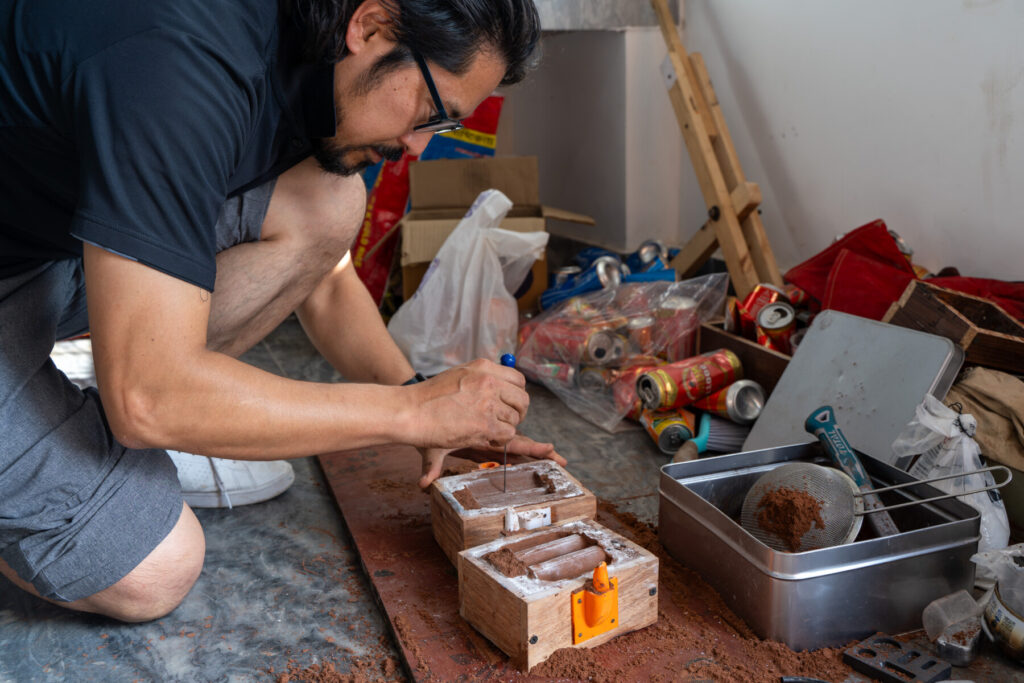
Learning through experimentation
Building capacity to tackle complex problems with MDDI
The Master in Design for Distributed Innovation (MDDI) is a research and innovation ecosystem for creative professionals, entrepreneurs, policy makers and agents of change who want to realize real-world responses to the climate crisis, social injustice and biodiversity loss. The program balances advanced technologies with social dynamics and covers immediate topics such as regenerative design, hybrid technologies, new materials, value creation and social innovation in both urban and rural territories.
In this post, we invite you to read about MDDI’s structure and expected outcomes.
How is the program organized?
As a distributed program, MDDI students experience a mix of online seminars with in-person mentorships and the production of physical prototypes in their local nodes. The program is structured in three modules of one trimester each, plus a final project implementation. Each module focuses on different levels of the Full Stack, which are developed in three tracks: Ecosystems, Communities and Technology.
Module 1: Why design?
The aim of this module is to establish a foundational understanding of the implications of design on natural, technological and social ecosystems. Students will gain methodological tools to design valuable and meaningful solutions.
Module 2: How to design?
This module focuses on providing technical skills necessary to develop sustainable and innovative design-systems based on the reconfiguration of technology, social dynamics and resources.
Module 3: Where to design?
In this last module, students will be introduced to diverse yet integrated strategies of applying and developing innovative projects in an economically, socially and environmentally regenerative manner.
Final Project
At the end of the program, students develop and implement a final project in collaboration with their node ecosystem. The projects are positive solutions that integrate their local ecosystem and community through technology, services or models.
What outcomes can you expect from MDDI?
Students are prepared to thrive in cities transitioning from traditional production paradigms to innovative approaches, empowering communities to address local challenges through localized production of physical goods (atoms) alongside the global dissemination of digital information (bits). This transformation is driven by the digital revolution in telecommunications, computation, and emerging digital manufacturing technologies, aligning with the goals of the Fab City global initiative.
Through MDDI, students enhance their capacity and resilience to address the needs of their local communities by gaining access to technology and knowledge that can help them to:
- Transform energy production models at local scales using complementary micro-generation and distribution technologies.
- Develop repositories of designs and new open-source technologies for the regeneration of essential natural systems in cities and in their bioregions.
- Increase the use of new raw materials from materials considered waste, associated with high demand for existing industrial capacity in cities and peri-urban areas.
- Reduce global-scale movement of materials and excess production by enabling cities to produce what they need on demand, primarily using local materials
- Promote the production of a large quantity of food in proximity to urban centers to reduce energy consumption in transportation and improve nutritional quality and transparency in supply chains.
- Improve the technological sovereignty of cities through increased infrastructure and training aiming to establish a local innovation model connected to global knowledge networks.
- Rethink the urban infrastructure needed to enable cities to be productive and to transform urban metabolism. This includes incorporating bio-digesters, biorefineries, material libraries, flexible factories, and fab labs as learning and prototyping centers.
To envision sustainable and productive cities, it’s crucial to embrace innovative processes that encourage local production and knowledge sharing within bioregional contexts. By fostering distributed innovation, cities can shift towards being restorative and regenerative. The MDDI program is suitable for anyone worldwide who is inspired to adopt a holistic mindset that recognizes the interconnectedness of all living beings in their way of thinking, doing and living.
You can read more about the program in our previous blog posts: MDDI builds on a distributed approach, five reasons to pursue MDDI, building a distributed network of designers and innovators and distributing the power of design and innovation. Do consult the MDDI website for more details and to apply for the next cycle before April 30th, 2024.
Explore the Master in Design for Distributed Innovation here.


